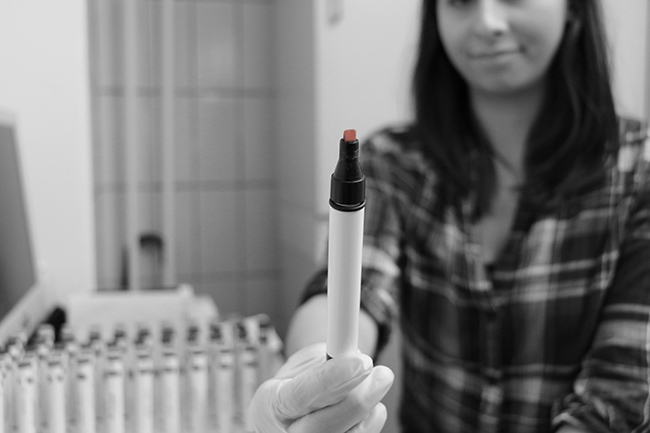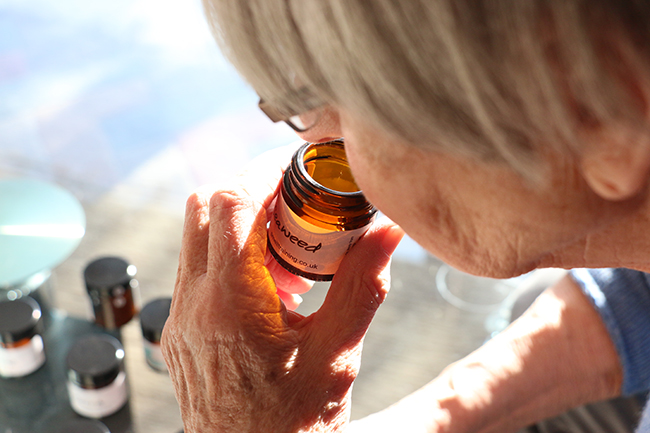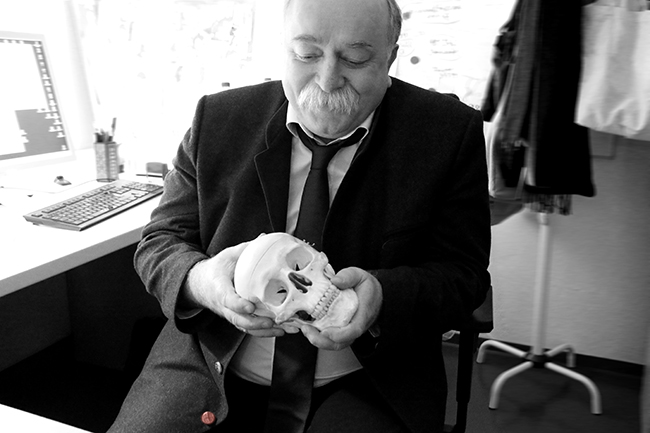How to retrain your sense of smell
COVID-19 takes a toll on our senses
Six out of ten people infected with Sars-CoV-2 lose their sense of smell. This loss often lasts for weeks to months. Sometimes it lasts forever. Smell training can help.

Without a sense of smell, there is no coffee aroma.
Olfactory loss is one of the first and most common symptoms of the COVID-19 infection. Julien Hsieh treats people with olfactory and taste disorders at the Geneva University Hospital. „The number of people with long-term olfactory disorders coming to our clinic has increased significantly since the onset of the pandemic,“ he says. Unfortunately, there is still only a limited awareness of the impact of olfactory impairment as a serious condition and the degree that it affects the quality of life.
Whether potatoes are burning in the kitchen or the house is on fire – those affected with loss of smell are unable to recognize the danger. Likewise, the scent of someone close by, the aroma of a favorite dish or the comforting smell of one’s own four walls are absent. Suzy Katz described her own experience with it in the New York Times as a feeling of no longer being able to properly connect with the associated smells of her deeply rooted, familiar environment. The author was infected with Covid-19 in April 2020 and has lived without a sense of smell ever since.
Six out of ten people infected with Sars-CoV-2 suffer from loss of smell or olfactory impairment. A study performed in Italy showed that olfactory loss lasted from several weeks to several months in about 15 percent of patients. However, according to an as-yet-unpublished study by the University of Trieste, the sense of smell was still impaired in about 60 percent of Covid-19 patients even six months after infection. A conservative estimate suggests that a total of 260,000 people in Switzerland, Germany, and Austria have been affected by short- or long-term olfactory disorders since the start of the pandemic.
From Anise to Cedarwood
The virus affects the nose in several ways. It invades the supporting cells of the olfactory mucosa. Without these cells, the function of the olfactory sensory cells breaks down. Perception of scent becomes increasingly difficult. “The virus seems to attack the stem cells that produce new olfactory sensory cells”, says neurobiologist Robert Datta of Harvard Medical School. “This prevents regeneration, which leads to longer-term damage.” It is already established from experience with other olfactory disorders caused by viral infections, that in about 70 percent of patients, the sense of smell usually takes two to three years to recover. In some, the sense of smell never returns.
In a consensus statement published in January 2021, an international team of 20 clinically active olfactory researchers, including Hsieh, examined which methods have proven effective in regaining the sense of smell after long-term post-viral olfactory loss. They came up with only one: olfactory training. The studies used to reach this conclusion predate the Corona pandemic. But Hsieh recommends this training to all of his patients with Covid-19-related olfactory disorders.

Clinicians can test the sense of smell, for example with the help of „sniffing sticks“.
Like Hsieh, olfactory researcher Thomas Hummel of the University of Dresden, also a co-author of the consensus statement, assumes that smell training works the same way for Covid-19-related olfactory problems. Studies on this are already underway. Compared with other post-viral olfactory disorders, those caused by Covid-19 are more aggressive, he says. And they are found more often in children.
During training, those affected sniff four different scents intensively twice a day for 20 seconds each. Additionally, those who choose to record the intensity of the scent on a scale can track and measure changes over time. Whether essential oils, spices, or whiskey – the choice of scent is up to each person. Studies show that changing the scent set every few weeks can increase training success. Smell perception usually improves after about three months. A meta-analysis has shown that smell training offers a two-to-three-fold chance of improvement.
Learning Machine in the Olfactory Brain

Sniffing every day at an odor – even if it is at first not perceivable – could speed up recovery.
The training causes adaptations both in the olfactory mucosa and in the brain. For example, networks in the brain that are jointly responsible for smelling become more active, the olfactory sensory cells change their firing rate, and areas in the cerebral cortex that are relevant for learning thicken. The reason for this is the plasticity of the olfactory system. Researchers also refer to the part of the brain responsible for smelling, the olfactory cortex, as a learning machine. The olfactory cells in the nose are also among the few nerve cells that can regenerate. People with olfactory loss (anosmia) benefit from this.
Various self-help organizations support those affected. One of the best known, AbScent, is based in the UK. From around 5,000 at the start of the pandemic, the number of people seeking advice on AbScent’s various channels has grown to over 30,000. Tirelessly, founder Chrissi Kelly explains how the smell training works in the COVID-19 19 Facebook group. One sufferer says goodbye to the group with the words: „Finally, after four and a half months, I have regained my sense of smell. I am so relieved.“
From Frustration to Enthusiasm
However, olfactory researcher Kathrin Ohla from the Jülich Research Center points out: „Olfactory training that fails to offer improvement despite regular and long-term implementation can be frustrating. In this case, it is often better to learn to live and make peace with the limitation.“
Not all people suffer equally from their smell blindness. „In our studies, we repeatedly find people who have no sense of smell at all, but who consider their sense of smell to be completely normal,“ says Hummel.

Smell researcher Prof. Thomas Hummel was one of the first to use smell training as a treatment for smell loss.
When training is effective, this intense concentration and engagement with scents can offer new and unusual enrichment possibilities. Journalist and COVID-19 sufferer Gabe Friedman sniffed his way through his parents‘ extensive spice rack twice a day. His sense of smell improved over the months, and he describes his sensory journey through the world’s spices as the most enjoyable meditation he ever experienced.
The text appeared in January 2021 in the Neue Zürcher Zeitung
translated by Steven Pitock
title picture: Valeriia Miller / pexels
picture 1 (coffee): Clay Banks / unsplash
picture 2 (sniffing stick) / 3 (smell training) / 4 (Prof. Hummel): Fabienne Hübener


